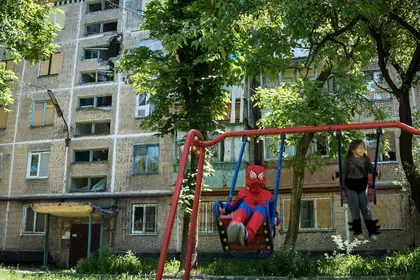The two cities have enjoyed a sister-city
relationship for 28 years – they signed a twinning partnership agreement in
March 1987 during the perestroika era
of the Soviet Union. Although 2,500 kilometers separate them, the residents of
Bochum have shown continuous support for the residents of Donetsk. Since the
early 1990s, the twinning association has raised money and collects goods to
support humanitarian associations and hospitals.
- Obtain the most current Ukraine news articles released today.
- Find the newest Ukraine news pieces that came out today.
Sending support got more difficult after
the Russian-instigated war started in eastern Ukraine, and the July 4
humanitarian aid truck convoy is the first one the association has managed to
get all the way to Donetsk since Russian-separatists overthrew the local
authorities in the city last year.
The convoy left Bochum on June
5, first passing through the
many Ukrainian customs formalities
so as to be recognized
as humanitarian aid, and then crossing the frontlines of the war zone.
It took the convoy more than six hours to cover
the last 50 kilometers to its destination.
An earlier shipment received in March was stopped in Mariupol, and could
only be taken further by car.
Clothes, toys, glasses and walkers were
sent to Donetsk, along with funds to support the Donetsk Fund of Social Welfare
and Charity, and supplies of medical equipment for children with leukemia, such
as catheters, syringes, and bandages.
The convoy was warmly welcomed.
“Unfortunately, paper and letters cannot
convey the feelings we feel and which
animate us,” Doctor
Svetlana Kolomenskaya from
the pediatric-oncology department
of Donetsk wrote in a letter of thanks to the association.
Facing a humanitarian crisis in late March,
she asked for support, writing that “soon
the parents will
face the question:
what should we
better buy for
our kids, food
or medicine?”
She also reported that on Feb. 4, shelling
had destroyed the operations block and surgical department of her
hospital. The support
from the twinning association has
also been crucial for
the local Donetsk Fund
of Social Welfare and Charity,
which has been redistributing humanitarian aid in Donetsk and other cities in eastern
Ukraine.
In particular, its program Food on Wheels
has been essential for the livelihood of the city. Initially started in 2007 to
distribute free lunches to elderly people who had been forced to work in
Germany during the Second World War, it currently helps war victims who were
not able to leave the conflict zone by distributing free meals four times a
week.
The program itself was
threatened several times in the previous year.
The huge increases in food and gas prices,
as well as the collapse of the economy and the banking system coming to a halt led
to money running out for the organization last November. The social workers
subsequently were forced to seek other jobs.
“We have spent all the humanitarian aid, we
have nothing left for the people,” wrote the volunteers of the Social Fund, while
thanking their German partners for their support.
They could only resume their work in early
January. After being assaulted by Kremlin-backed
separatists in November, the director of the fund, Serhiy Yakubenko, said he
had to flee the city.
He was later hospitalized in Kyiv. Earlier,
in May, the charity’s car, donated in 2007 by the German Foundation EVZ, was involved
in a road accident with a separatist truck.
The German association provides moral as
well as material support. Members stay in touch with their partners in Ukraine
through e-mailed messages and phone
calls, and the
letters they publish
are testimony to the
gratitude of Donetsk
residents.
Meanwhile, the association has already sent
off another aid shipment, which left Bochum on July 7.
Kyiv
Post summer intern Yves Souben can be reached at ysouben.kp@gmail.com.
You can also highlight the text and press Ctrl + Enter




